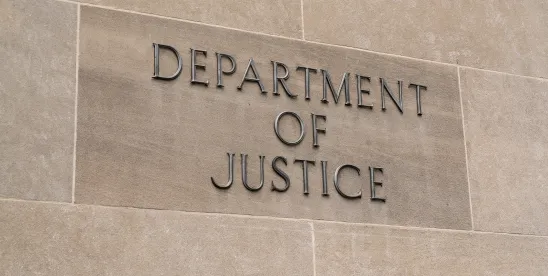On February 24, 2023, the US Department of Justice (DOJ) rolled out a corporate self-disclosure policy (the Policy) to be applied by all 93 US Attorneys’ Offices throughout the country. The details of the Policy—which formalizes and defines what will be required for companies seeking credit for a “voluntary self-disclosure”—have been drawn from existing policies within other components of DOJ, including, notably, the Foreign Corrupt Practices Act Unit and Antitrust Division. The new Policy ensures for the first time that uniform standards will be applied at the local level by all US Attorneys’ Offices nationwide.
In short, the Policy heavily encourages timely self-disclosure and cooperation by promising the prospect of more lenient resolutions (including declinations) and reduced penalties for companies that promptly self-report misconduct. Consistent with prior recent statements from DOJ leadership, the Policy puts particular emphasis on the timeliness of self-reporting and provides details on how US Attorneys’ Offices will evaluate certain potentially aggravating factors, including the involvement of senior leadership in the alleged misconduct and the company’s history of regulatory, civil or criminal misconduct. (See, e.g., Remarks from Assistant Attorney General Kenneth A. Polite, Jr., on Revisions to the Criminal Division’s Corporate Enforcement Policy, Jan. 17, 2023; Memorandum from Deputy Attorney General Lisa O. Monaco, “Further Revisions to Corporate Criminal Enforcement Policies Following Discussions with Corporate Crime Advisory Group,” Sept. 15, 2022; Memorandum from Deputy Attorney General Lisa O. Monaco, “Corporate Crime Advisory Group and Initial Revisions to Corporate Criminal Enforcement Policies,” Oct. 28, 2021.) While certain aspects of the Policy may thus be familiar, it nonetheless provides important guidance to those engaging with local US Attorneys’ Offices on corporate investigations and prosecutions, while setting consistent standards for engaging with federal prosecutors nationwide.
In Depth
ELEMENTS OF THE POLICY
Under the Policy, companies that self-report misconduct, fully cooperate with any investigation by DOJ, and timely and “appropriately” remediate will receive more lenient treatment than if prosecutors discover the misconduct or commence an investigation prior to the self-disclosure. See Policy at (II)(A).
The Policy puts particular emphasis on the timeliness of self-disclosure. A company is considered to have voluntarily self-disclosed if it (i) becomes aware of the misconduct before the DOJ has been made aware of the misconduct and (ii) makes a timely disclosure of all known relevant facts “prior to an imminent threat of disclosure or government investigation.” See Policy at (A)(2)-(3). As the DOJ emphasized in its January 2023 revisions to the Criminal Division’s Corporate Enforcement Policy, “timely” may effectively mean “immediately” where corporations seek a full declination. Indeed, the Policy specifically notes that “a company may not know all relevant facts at the time of the [voluntary self-disclosure]” and suggests that a company “make clear that its disclosure is based upon a preliminary investigation or assessment of information.” The Policy adds that DOJ expects additional, comprehensive, factual updates from companies as their “investigation progresses.”
Even where a company believes DOJ may already be aware of the misconduct—and thus that a self-disclosure may not fully meet the criteria above—the new Policy still encourages “[p]rompt self-disclosures to the government,” noting that such self-disclosure will still “be considered favorably.” See Policy at (I).
The Policy also includes guidelines on what is expected of a corporate self-disclosure, including disclosure of “all relevant facts concerning the misconduct that are known to the company at the time of the disclosure.” Companies seeking cooperation credit are further expected to “move in a timely fashion to preserve, collect, and produce relevant documents and/or information, and provide timely factual updates to the US [Attorney’s Office].” Id. at (I)(A)(3).
Companies that voluntarily self-disclose misconduct and meet the other metrics set forth by the policy, including fully cooperating and timely and appropriately remediating the criminal conduct, will, in the absence of aggravating factors, receive significant benefits. Most notably, companies that meet these criteria will not be required to plead guilty to a crime. In such cases, the resolution could include a declination of charges, a non-prosecution agreement or a deferred prosecution agreement. Companies also will face substantially reduced penalties. Prosecutors can forego imposing a criminal penalty entirely and cannot impose a penalty that is greater than 50% below the low end of the US Sentencing Guidelines’ fine range. Prosecutors are also instructed to decline imposing an independent compliance monitor if the company demonstrates that it has already implemented and tested an effective compliance program. See id. at (II)(A)-(B).
In instances where aggravating factors are present—such as the involvement of a company’s current executive management or conduct that is “deeply pervasive” throughout the company—the Policy provides guidance on when and under what circumstances reduced penalties, and even a potential declination, may remain available through full and timely self-disclosure and cooperation. Id. at (II)(A).
THE SIGNIFICANCE OF A UNIFORM POLICY APPLIED LOCALLY
Although DOJ had previously directed all DOJ components to develop a self-disclosure policy, by issuing a uniform policy applicable to all 93 US Attorneys’ Offices, DOJ has provided a more predictable level of consistency and uniformity to corporate prosecutorial decisions nationwide. This no doubt an effort to avoid cherry-picking—DOJ did not want companies choosing to disclose to the US Attorney’s Office that, in their view, operated under the most favorable or lenient policy. Moreover, through this uniform policy, DOJ has continued its recent heavy focus on self-disclosure and cooperation, ensuring that this focus is now in place in every District.
The uniform policy also presents an opportunity. When faced with potential misconduct, organizations may now make more informed decisions about whether self-disclosure to a local prosecutor is appropriate and can be confident that uniform written guidelines will govern consideration of that self-disclosure. Disclosure to local US Attorneys’ Offices may, in turn, present considerable advantages where companies are more likely to have closer connections and where prosecutors may be better positioned to understand and appropriately credit the company’s significance in and contributions to the community, all of which are relevant and frequently important factors in a corporate resolution.
WHAT COMES NEXT
Local prosecutors will likely look for opportunities to exercise the new policy and provide further guidance on how it will be applied going forward, including by establishing a track record of rewarding self-disclosure through more lenient treatment and insisting on criminal resolutions and penalties where there was no self-disclosure, even where there has been significant subsequent cooperation.
While the existence of the new Policy, of course, still does not mean that self-disclosure will always be the appropriate choice every time alleged misconduct has been identified, it is the latest in a wave of announcements from DOJ suggesting that the decision as to whether to self-disclose should be an informed one made with care. Companies will want to ensure that there is thoughtful discussion about whether such disclosure is appropriate, and organizations should consider proactively developing policies and procedures around how to engage the right people in that discussion—from compliance, to legal, to the board—and how to do so quickly. In order to obtain the benefits of self-disclosure, these complex decisions must be vetted swiftly and may need to be based on incomplete information. The process for making those decisions should not be established only when a decision must be made.




 />i
/>i

